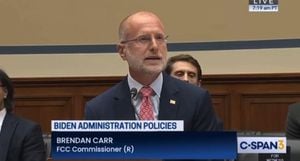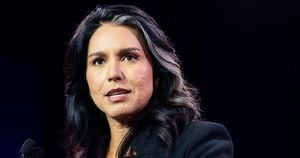With the 2024 presidential election inching closer, the spotlight is firmly on Vice President Kamala Harris and her proposed economic policies. Importantly, analysts suggest Harris's economic platform will closely mirror President Biden's established blueprint, particularly on pivotal issues like taxes, trade, and immigration. This continuity aims to project stability as she steps forward as the likely Democratic presidential nominee.
Experts, including Mark Zandi, the chief economist at Moody’s Analytics, assert, “I think she will follow the Biden economic script closely.” This alignment stems from a sense of urgency—the Democrats want to present their achievements to voters before time runs out. With the Democratic National Convention just weeks away, Harris appears to be positioning herself as the candidate of continuity and stability.
The overarching economic concerns frame Harris's campaign. Polls indicate she faces skepticism from voters who trust Trump slightly more on economic issues. While 51% prefer Trump on managing the economy, 48% lean toward Harris, emphasizing the need for her to clearly articulate her economic aspirations.
After Biden’s withdrawal from the race, support rapidly consolidated around Harris, who quickly garnered backing from major Democratic figures, including Biden himself, former House Speaker Nancy Pelosi, and Illinois Governor JB Pritzker. Despite this, she has yet to secure the nomination formally.
Harris’s economic strategies encompass various areas, beginning with taxation. She is poised to endorse Biden's plan of extending Trump's tax cuts for low- and middle-income households but aims to eliminate reductions for those earning over $400,000 annually. Analysts predict she will also support Biden’s initiative to raise the corporate tax rate from 21% to 28%, even though, as a candidate in 2019, she had favored increasing it to 35%.
On immigration, Harris champions bipartisanship. She supported measures tightening asylum rules and empowering the President to restrict border crossings should certain thresholds be exceeded, reflecting recent executive actions taken by Biden. Critics, especially from the Republican side, are likely to scrutinize her handling of border crossings, particularly as her role involved addressing immigration-related crises during the Biden administration.
When it pertains to trade, Harris is expected to maintain Biden’s existing tariffs imposed during Trump’s presidency. This includes the steep tariffs on imports from China, showing her inclination to continue the current protectionist stance.
Another facet of Harris's economic agenda focuses on social service policies. She is likely to follow Biden’s proposals to make childcare more affordable, provide free college tuition, and reduce student loan debt. Recently, she highlighted, “President Biden and I have forgiven more student loan debt than any Administration in history—$167 billion for nearly 5 million Americans.”
Harris's insightful precursors as California’s Attorney General suggest she may adopt even more rigorous antitrust enforcements against big tech entities, claiming this as her field of expertise. This indicates she could lean toward innovative economic policies, distinguishing her administration from Biden’s—should she win.
Detractors of Harris critique her immigration policies, recalling her allegations against Trump for divisive rhetoric toward immigrants. Yet, her critics might accuse her of failing to address the rising number of crossings during her time with the Biden administration. She has been candid about the challenges of balancing public safety with humane immigration policies, maintaining, “We have to get this right.”
While economic empowerment programs characterize Harris forefront, she faces challenges rallying support for her policy proposals amid evolving public sentiments toward economic strategy. Many Americans still grapple with rising prices and unease about their finances, fostering skepticism about government initiatives.
For voters like Saiyda Bey from North Philadelphia, the sentiment is palpable. She believes stronger employment prospects under Trump bolstered the economy during his presidency. Bey, who works three jobs to make ends meet, is apprehensive about Harris’s plans, emphasizing tangible change, not just political rhetoric. “I just struggled less under Trump’s administration,” she recalls. This raises the critical question: can Harris convince voters, especially those with economic anxieties, of her approach's efficacy?
Yet, Harris aims to inspire hope and assurance among voters, echoing sentiments of opportunity and growth. She intends to augment the middle class—her administration's defining goal. Advocates believe her child care affordability initiatives, alongside paid family leave, could resonate well with the working class, particularly women, who have faced disproportionate challenges during the pandemic.
But as Harris approaches the critical moments of her campaign, the political climate remains tempestuous. The former president’s enduring support among Republican voters poses additional hurdles. While GOP figures tout economic gripes, Harris acknowledges struggles from rising living costs and inflation as pivotal talking points during her rallies. Navigability of these concerns become significant during the discourse surrounding economic policy, and how they translate to real-world applicability.
Reflecting on the overall economic climate, inflation rates have gradually decreased, yet household concerns persist. Voters indicate middle-class families continue wrestling with making ends meet, which has intensified scrutiny on the Democratic Party’s economic policies. It merits exploration, how government action—or lack thereof—affects everyday Americans.
Harris’s latest actions indicate she’s acutely aware of the spotlight. Her upcoming policy rollout, primarily addressing inflation and cost-of-living concerns, constitutes her vision for economic recovery. At rallies, she reassures voters of her administration's focused execution on fiscal policies aimed at bolstering economic stability.
By continuing to engage actively with voters, especially attendees questioning her policies, Harris hopes to build trust and resonate with those grappling with their economic realities. Among the political theater, she seeks out connections with average Americans—offering both empathy and commitment toward reform.
The upcoming 2024 election is fast approaching, and as it draws nearer, voters seem increasingly polarized on the candidates’ economics. Harris, fueled by energy from recent polling, buoyantly rallies as she highlights potential economic uplift and promises continuity within her platform driven by Green New Deal components.
With each public appearance, she is pressed on policies offering affordable living, affirming her determination to push through reforms. Harris declares her pledge to sustainability and accountability across economic sectors strengthens her resolve, paving the way for prospective growth and progress.
The juxtaposition of Harris and Trump epitomizes the contrasting narratives leading to the election. With divergent approaches to economic management, their respective platforms embody the battle for the American vote, as each candidate stakes their claims on who can deliver results.
While many Americans express lingering concern about the hapless state of the economy, this election encapsulates differing opinions on economic priorities, which will determine policy under the advertisements of either Harris or Trump. The stakes are undeniably high for each party, as they carve their paths to electoral success.



